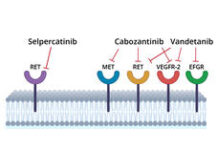In the annual Research Round Up series, Cancer.Net Editorial Board members answer the question, “What was the most exciting or practice-changing research in your field presented at the 2023 ASCO Annual Meeting?” In this episode, 3 Cancer.Net Associate Editors discuss new research presented at the meeting in breast cancer, lymphoma, multiple myeloma, brain tumors, and von Hippel-Lindau syndrome.
Listen below, and subscribe to Cancer.Net Podcasts wherever you listen to podcasts for new episodes in this series.
New research in treating breast cancer
 Dr. Norah Lynn Henry, the 2023 Cancer.Net Associate Editor for Breast Cancer, discusses research in early-stage and metastatic breast cancer. First, she discusses the phase 3 NATALEE clinical trial, which was studying whether adding the targeted therapy drug ribociclib (Kisqali) to hormonal therapy for people with hormone receptor-positive (HR-positive), HER2-negative early-stage breast cancer could reduce their risk of recurrence. [3:13]
Dr. Norah Lynn Henry, the 2023 Cancer.Net Associate Editor for Breast Cancer, discusses research in early-stage and metastatic breast cancer. First, she discusses the phase 3 NATALEE clinical trial, which was studying whether adding the targeted therapy drug ribociclib (Kisqali) to hormonal therapy for people with hormone receptor-positive (HR-positive), HER2-negative early-stage breast cancer could reduce their risk of recurrence. [3:13]
Next, she discusses 3 studies in treating metastatic breast cancer:
-
The phase 3 SONIA clinical trial, which was evaluating whether using hormonal therapy alone instead of in combination with targeted therapy to treat people with HR-positive, HER2-negative metastatic breast cancer impacted the benefit of the treatment. [5:00]
-
The phase 3 PADA-1 clinical trial, which used liquid biopsy to determine which patients with HR-positive, HER2-negative metastatic breast cancer had an ESR1 mutation. Researchers then evaluated whether switching patients whose cancer had the mutation to the next line of treatment helped slow their cancer growth for longer. [5:59]
-
The phase 2 X7-7 clinical trial, which was studying whether giving capecitabine (Xeloda) to people with metastatic breast cancer for 1 week followed by 1 week off, rather than 2 weeks followed by 1 week off, was easier for patients to tolerate without impacting the treatment’s benefit. [6:38]
Progress in treating lymphoma and multiple myeloma
 Dr. Christopher Flowers, the 2023 Cancer.Net Associate Editor for Lymphoma, describes 3 studies in treating lymphoma and multiple myeloma. First, he discusses the phase 3 ZUMA-7 clinical trial, which was studying whether treating people with diffuse large B-cell lymphoma (DLBCL) that came back after initial treatment using chimeric antigen receptor (CAR) T-cell therapy instead of a stem cell transplant helped them live longer. [9:30] Next, he describes the phase 3 CARTITUDE-4 clinical trial, which was studying whether CAR T-cell therapy could help slow or stop cancer growth in people with multiple myeloma that was no longer responding to treatment with lenalidomide (Revlimid). [11:56]
Dr. Christopher Flowers, the 2023 Cancer.Net Associate Editor for Lymphoma, describes 3 studies in treating lymphoma and multiple myeloma. First, he discusses the phase 3 ZUMA-7 clinical trial, which was studying whether treating people with diffuse large B-cell lymphoma (DLBCL) that came back after initial treatment using chimeric antigen receptor (CAR) T-cell therapy instead of a stem cell transplant helped them live longer. [9:30] Next, he describes the phase 3 CARTITUDE-4 clinical trial, which was studying whether CAR T-cell therapy could help slow or stop cancer growth in people with multiple myeloma that was no longer responding to treatment with lenalidomide (Revlimid). [11:56]
Finally, Dr. Flowers discusses the phase 3 SWOG S1826 clinical trial, which was studying whether adding nivolumab (Opdivo) to chemotherapy helped reduce the risk of cancer-related death when compared with adding brentuximab (Adcetris) to chemotherapy for children and adults with stage III or IV Hodgkin lymphoma. [12:54]
Advances in caring for people with brain tumors and von Hippel-Lindau syndrome
 Dr. Roy E. Strowd, III, the 2023 Cancer.Net Associate Editor for Central Nervous System Tumors, discusses 3 studies in treating people with brain tumors. First, he discusses the phase 3 INDIGO clinical trial, which was evaluating whether the targeted therapy drug vorasidenib could help people with grade 2 glioma live longer without tumor growth. [16:28] Then, he discusses the phase 1 INB-200 clinical trial, which was evaluating the ideal dose for a new immunotherapy in treating people with newly diagnosed glioblastoma. [23:47] To conclude, Dr. Strowd describes a study in von Hippel-Lindau syndrome that was observing whether belzutifan (Welireg) was effective in treating brain tumors in people with this genetic condition. [25:25]
Dr. Roy E. Strowd, III, the 2023 Cancer.Net Associate Editor for Central Nervous System Tumors, discusses 3 studies in treating people with brain tumors. First, he discusses the phase 3 INDIGO clinical trial, which was evaluating whether the targeted therapy drug vorasidenib could help people with grade 2 glioma live longer without tumor growth. [16:28] Then, he discusses the phase 1 INB-200 clinical trial, which was evaluating the ideal dose for a new immunotherapy in treating people with newly diagnosed glioblastoma. [23:47] To conclude, Dr. Strowd describes a study in von Hippel-Lindau syndrome that was observing whether belzutifan (Welireg) was effective in treating brain tumors in people with this genetic condition. [25:25]
Disclosure information for this podcast’s speakers can be found in their individual biographies linked to above.
Was this podcast useful? Please subscribe, rate, and review Cancer.Net Podcasts wherever you listen to podcasts. This prerecorded podcast can be listened to online or downloaded to your computer. A transcript is also available. For more information, visit the Cancer.Net podcast page.
Cancer.Net podcasts are edited for length and content.








